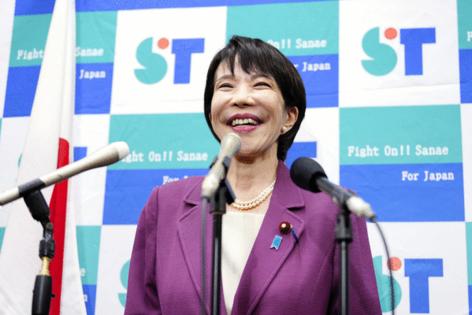Japan may see its first female PM despite limited progress on gender gap
Published in News & Features
Japan could soon see its first female prime minister, with Sanae Takaichi emerging among the front runners in the ruling Liberal Democratic Party’s leadership race, a significant achievement in a country where women leaders remain a rarity.
Hardline conservative Takaichi has consistently been a public favorite, along with agriculture minister Shinjiro Koizumi, ahead of the LDP’s leadership vote on Oct. 4. Last year, Takaichi narrowly lost to outgoing Prime Minister Shigeru Ishiba in the runoff round of the LDP leadership race.
If Takaichi wins both party and parliamentary votes, she will make history as Japan’s first female premier. For a country that has seen limited progress on gender equality, especially in politics, that could represent a watershed moment.
“Having a woman become prime minister could really shift how the world sees Japan,” said Hiroko Takeda, a professor at the Graduate School of Law, Nagoya University, who has researched politics and gender issues.
Japan ranks 118th out of 148 countries in the World Economic Forum’s Gender Gap Index, trailing behind nations such as Senegal and Angola. The Asian country scores especially poorly in political and economic participation, having never appointed a female prime minister, finance minister or central bank governor.
Female representation in parliament also remains limited. As of August, women make up just 15.7% of the more powerful lower house, well below the global average of 27.1% and the Asian regional average of 22.1%, according to the Inter-Parliamentary Union.
A native of Nara Prefecture, Takaichi has cited former British Prime Minister Margaret Thatcher as a key inspiration.
While not previously seen as a strong advocate on women’s issues, Takaichi’s stance has been shifting. On Friday, she pledged to make babysitter fees partially tax-deductible and proposed corporate tax breaks for companies that provide in-house childcare services.
“I have personally experienced nursing and caregiving three times in my life. That’s why my determination has only grown stronger to reduce the number of people forced to leave their jobs due to caregiving, child-rearing or children refusing to attend school,” Takaichi said. “I want to create a society where people don’t have to give up their careers.”
Drawing on her own struggles with menopause, Takaichi also vowed to step up awareness efforts around women’s health.
Takaichi’s unexpectedly sympathetic tone may pose a challenge for another prominent contender Shinjiro Koizumi, the young reformist often seen as a proponent of diversity and gender equality. Last year, Koizumi backed a proposal to allow married couples the option of keeping separate surnames, an idea widely seen as a test of support for gender equality.
Takaichi has previously opposed any attempt to change the law to allow separate surnames, but did not address the topic in her 90-minute press conference on Friday.
Still, if she’s appointed, some experts say it may be down to the “glass cliff” phenomenon, where women are elevated to leadership roles during times of crisis, when the risk of failure is high.
Two election flops have left the LDP struggling to hold onto power without a majority in either chamber of parliament. The next leader will inherit a fractured legislature and face the challenge of negotiating with opposition parties to pass critical legislation, including the national budget and economic packages. Some analysts warn the next administration could be short-lived, with the risk of a no-confidence vote already looming.
“If she fails, people will simply say, ‘We tried something new and it didn’t work,’ push her off the cliff and make sure she can’t climb back up again,” Takeda added.
This pattern mirrors recent developments in other advanced democracies. In the U.K., Theresa May became prime minister in 2016 after the Brexit vote triggered political and market turmoil, while Liz Truss took over in 2022 amid soaring inflation and domestic discontent. In 2025, Sussan Ley was elected as the first female leader of Australia’s Liberal Party following its worst electoral defeat.
Takeda noted that while Koizumi has the support of his former prime minister father, Takaichi lacks that kind of dynastic backing, another factor raising the risk that the LDP might “toss aside” its potential first female leader in short order.
©2025 Bloomberg L.P. Visit bloomberg.com. Distributed by Tribune Content Agency, LLC.







Comments